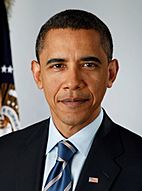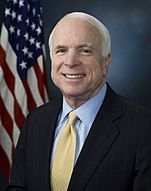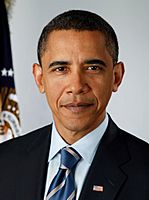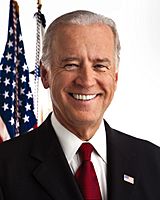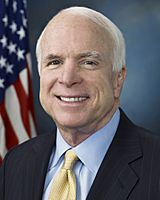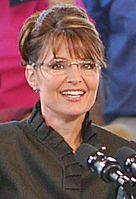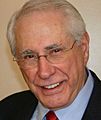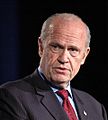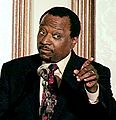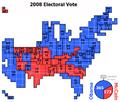United States presidential election, 2008 facts for kids
|
|||||||||||||||||||||||||||||
|
|||||||||||||||||||||||||||||
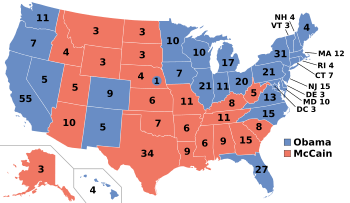
Electoral college votes for 2008. The winning candidate needs 270 electoral votes out of a total of 538, which is just over 50%.
|
|||||||||||||||||||||||||||||
|
|||||||||||||||||||||||||||||
The United States presidential election of 2008 was a big political event. It happened on November 4, 2008. On this day, Americans chose their next President and Vice President.
Barack Obama from the Democratic Party won the election. He defeated John McCain from the Republican Party. Obama became the first African-American president. He officially started his job on January 20, 2009. To win a US presidential election, a candidate needs to get at least 270 electoral votes.
Contents
Choosing the Democratic Candidate
This section explains how the Democratic Party chose its main candidate.
Democratic Primary Race
Many people wanted to be the Democratic Party's candidate for president. The main candidates were Barack Obama, Hillary Clinton, John Edwards, and Joe Biden.
The biggest competition was between Barack Obama and Hillary Clinton. It was a very close race. Hillary Clinton won more individual votes from people. However, Obama won more "unpledged delegates." These delegates helped him get the party's nomination.
Almost all the candidates who didn't win later supported Barack Obama. One candidate, Mike Gravel, joined another party instead.
On August 23, 2008, Barack Obama chose Joe Biden to be his running mate. This means Joe Biden would be the candidate for Vice President.
Democratic Nominees
| Democratic Party Ticket, 2008 | |||||||||||||||||||||||||||||
| Barack Obama | Joe Biden | ||||||||||||||||||||||||||||
|---|---|---|---|---|---|---|---|---|---|---|---|---|---|---|---|---|---|---|---|---|---|---|---|---|---|---|---|---|---|
| for President | for Vice President | ||||||||||||||||||||||||||||
| U.S. Senator from Illinois (2005–incumbent) |
U.S. Senator from Delaware (1973–incumbent) |
||||||||||||||||||||||||||||
| Campaign | |||||||||||||||||||||||||||||
Other Democratic Candidates
Many other people ran for the Democratic nomination. Here are some of them:
- Hillary Clinton, a U.S. Senator from New York. She stopped running on June 7, 2008, and supported Barack Obama.
- John Edwards, a former U.S. Senator from North Carolina. He stopped running on January 30, 2008, and supported Barack Obama.
- Bill Richardson, the Governor of New Mexico. He stopped running on January 10, 2008, and supported Barack Obama.
- Dennis Kucinich, a U.S. Representative from Ohio. He stopped running on January 24, 2008, and supported Barack Obama.
- Joe Biden, a U.S. Senator from Delaware. He stopped running on January 3, 2008. He later became Obama's choice for Vice President.
Choosing the Republican Candidate
This section explains how the Republican Party chose its main candidate.
Republican Primary Race
Many people also wanted to be the Republican Party's candidate. Some of the main candidates were John McCain, Mitt Romney, and Mike Huckabee.
The current Republican President, George W. Bush, could not run again. This is because a president can only be elected twice. The Vice President, Dick Cheney, also decided not to run.
Many candidates stopped running early in the process. This left John McCain, Mike Huckabee, and Mitt Romney as the top choices.
In the end, John McCain won the Republican nomination. He won by a clear majority of votes.
John McCain then chose Sarah Palin to be his running mate for Vice President.
Republican Nominees
| Republican Party Ticket, 2008 | |||||||||||||||||||||||||||||
| John McCain | Sarah Palin | ||||||||||||||||||||||||||||
|---|---|---|---|---|---|---|---|---|---|---|---|---|---|---|---|---|---|---|---|---|---|---|---|---|---|---|---|---|---|
| for President | for Vice President | ||||||||||||||||||||||||||||
| U.S. Senator from Arizona (1987–incumbent) |
9th Governor of Alaska (2006–2009) |
||||||||||||||||||||||||||||
| Campaign | |||||||||||||||||||||||||||||
Other Republican Candidates
Here are some other people who ran for the Republican nomination:
- Mitt Romney, a former Governor of Massachusetts. He stopped running on February 7, 2008, and supported John McCain.
- Mike Huckabee, a former Governor of Arkansas. He stopped running on March 4, 2008, and supported John McCain.
- Ron Paul, a U.S. Representative from Texas. He stopped running on June 12, 2008.
- Rudy Giuliani, a former Mayor of New York City. He stopped running on January 30, 2008, and supported John McCain.
- Fred Thompson, a former U.S. Senator from Tennessee. He stopped running on January 22, 2008, and supported John McCain.
The Election Campaign
The time leading up to the election is called the campaign. This is when candidates try to convince people to vote for them.
The biggest topic during the 2008 campaign was the bad economy. Other important issues included health care, the Iraq War, and the fight against terrorism.
The president at the time, George W. Bush, was not very popular. This was because of a big economic downturn called the "Great recession" that started in 2007. The Obama campaign often compared John McCain to President Bush.
There were four television debates during the campaign. Three debates were between the presidential candidates. One debate was between the vice-presidential candidates.
Election Results
On election day, people voted for their chosen candidates. Here are the final results:
| Candidate | Votes | % | States won | Electoral Votes |
|---|---|---|---|---|
| Barack Obama (Democrat) |
69,498,516 | 52.9% | 28+DC+NE-02 | 365 |
| John McCain (Republican) | 59,948,323 | 45.7% | 22 | 173 |
| Ralph Nader (Independent) | 739,034 | 0.56% | 0 | 0 |
| Bob Barr (Libertarian) | 523,715 | 0.40% | 0 | 0 |
| Chuck Baldwin (Constitution) | 199,750 | 0.15% | 0 | 0 |
| Cynthia McKinney (Green) | 161,797 | 0.12% | 0 | 0 |
| Other | 242,685 | 0.18% | 0 | 0 |
| Total | 131,313,820 | 100.00% | 50 + DC | 538 |
Barack Obama won the election with 365 electoral votes. He also won the most individual votes from people across the country.
Images for kids
-
Senator
Hillary Rodham Clinton
of New York
(campaign)
(Withdrew on June 7, 2008) -
Former Senator
John Edwards
of North Carolina
(campaign)
(Withdrew on January 30, 2008) -
Governor
Bill Richardson
of New Mexico
(campaign)
(Withdrew on January 10, 2008) -
Representative
Dennis Kucinich
of Ohio
(campaign)
(Withdrew on January 24, 2008) -
Former Senator
Mike Gravel
of Alaska
(campaign)
(Withdrew on March 25, 2008) -
Senator
Christopher Dodd
of Connecticut
(campaign)
(Withdrew on January 3, 2008) -
Former Governor
Tom Vilsack
of Iowa
(campaign)
(Withdrew on February 23, 2007) -
Former Governor
Mitt Romney
of Massachusetts
(campaign)
(Withdrew on February 7, 2008) -
Former Governor
Mike Huckabee
of Arkansas
(campaign)
(Withdrew on March 4, 2008) -
Representative
Ron Paul
of Texas
(campaign)
(Withdrew on June 12, 2008) -
Former NYC Mayor
Rudy Giuliani,
of New York
(campaign)
(Withdrew on January 30, 2008) -
Former Senator
Fred Thompson
of Tennessee
(campaign)
(Withdrew on January 22, 2008) -
Former U.S. ECOSOC Ambassador
Alan Keyes,
of Maryland
(campaign)
(Withdrew on April 15, 2008) -
Representative
Duncan Hunter
from California
(campaign)
(Withdrew on January 19, 2008) -
Representative
Tom Tancredo
of Colorado
(campaign)
(Withdrew on December 20, 2007) -
Senator
Sam Brownback
of Kansas
(Withdrew on October 18, 2007) -
Former Governor
Jim Gilmore
of Virginia
(campaign)
(Withdrew on July 14, 2007) -
Former HHS Secretary
Tommy Thompson,
of Wisconsin
(campaign)
(Withdrew on August 12, 2007) -
George W. Bush, the president in 2008. His term ended on January 20, 2009.
-
Barack Obama campaigns in Akron, Ohio on February 23, 2008.
-
John McCain and Sarah Palin with their families and actor Robert Duvall in Albuquerque, New Mexico, September 6, 2008.
-
Obama campaigned in Cleveland, Ohio, using a "Change We Need" sign.
-
This map shows how votes changed between the 2004 and 2008 elections.
See also
 In Spanish: Elecciones presidenciales de Estados Unidos de 2008 para niños
In Spanish: Elecciones presidenciales de Estados Unidos de 2008 para niños


